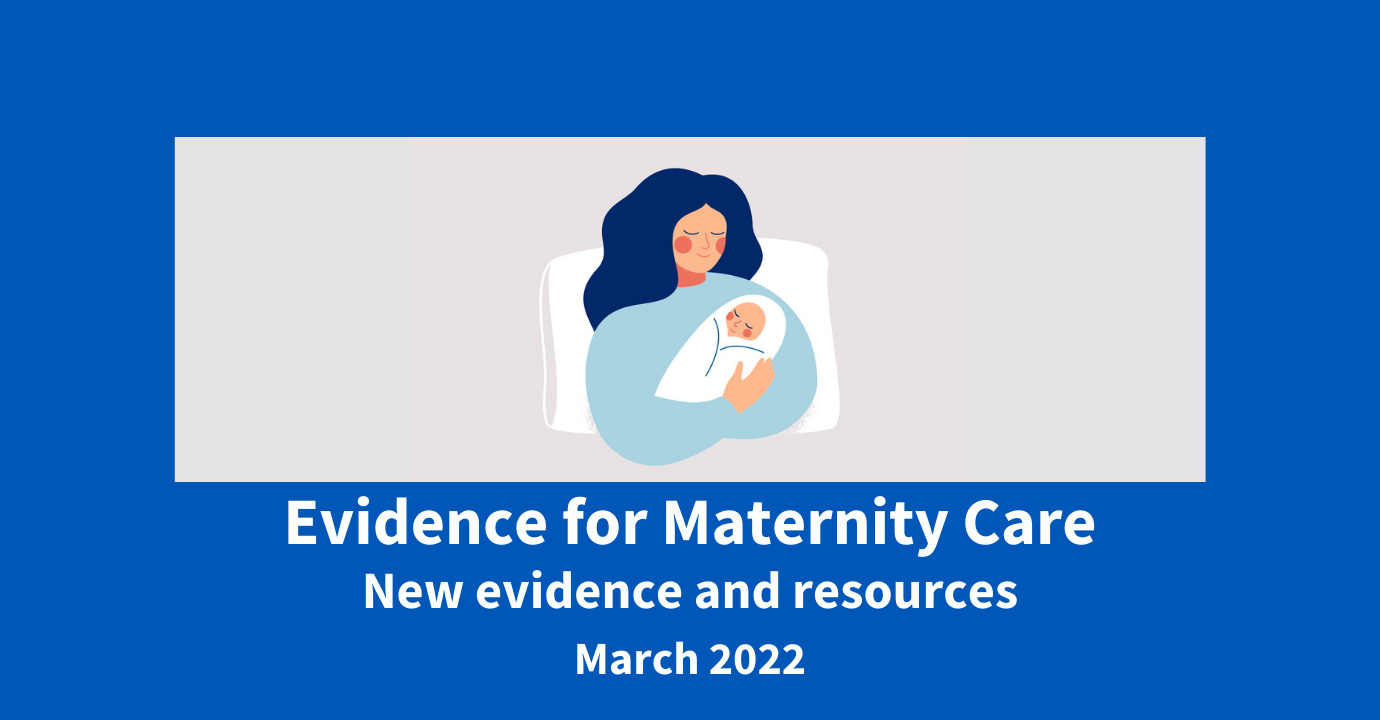The latest evidence and resources for midwives and clinical support staff. You can either scroll through this page or click on any of the links below to jump to the relevant section.
Please note, unlike the rest of our blogs, our ‘Evidence for Maternity Care: new evidence and resources’ blogs will not be updated.
- COVID-19
- Postnatal care and care of the newborn, including preterm infants
- Other
- News and other opportunities
1
COVID-19
This year, Cochrane is continuing to produce new and updated reviews in response to the pandemic. We have blogged about many of them and this blog COVID-19 evidence: a Cochrane round-up brings together a large collection of evidence and resources, starting from when this evidence was first being produced in spring 2020. Plus, we have two blogs on COVID-19 treatments: 1) Treatments for mild COVID-19 and 2) Treatments for moderate to severe COVID-19: Cochrane evidence. Like the reviews themselves, all our blogs are updated to reflect new evidence.
Cochrane Special Collections
Cochrane Special Collections assemble Cochrane Reviews on important topics for the prevention and treatment of COVID-19. They are developed with experts from our global Cochrane network. They are based on World Health Organization interim guidance, and continuously updated. You can find Coronavirus (COVID-19) Special Collections here.
Cochrane Podcasts
Cochrane COVID-19 Podcasts offer short summaries of Cochrane COVID-19 reviews from the authors themselves. A good way to hear the latest Cochrane evidence in under 5 minutes each.
Cochrane Clinical Answers
Cochrane Clinical Answers (CCAs) provide a readable, digestible, clinically-focused entry point to rigorous research from Cochrane Reviews. They are designed to be actionable and to inform point-of-care decision-making. Each CCA contains a clinical question, a short answer, and data for the outcomes from the Cochrane Review deemed most relevant to practising healthcare professionals.
You can find Cochrane Clinical Answers related to COVID-19 here.
2
Postnatal care and care of the newborn, including preterm infants
Continuous glucose monitoring for the prevention of morbidity and mortality in preterm infants
The Cochrane Review Continuous glucose monitoring for the prevention of morbidity and mortality in preterm infants (December 2021) highlights an evidence gap, with the effects of continuous glucose monitoring (CGM) on preterm infant mortality or morbidities remaining uncertain.
Cuffed versus uncuffed endotracheal tubes for neonates
The Cochrane Review Cuffed versus uncuffed endotracheal tubes for neonates (January 2022) has highlighted an evidence gap on the benefits and harms of cuffed (inflated or non-inflated) endotracheal tubes (ETTs) compared with uncuffed ETTs for respiratory support in neonates.
Feeding intervals for bolus feeding in very preterm infants
Cochrane Clinical Answer: How do short feeding intervals compare with long feeding intervals for bolus feedings in very preterm infants?
Indomethacin for treating symptomatic patent ductus arteriosus (PDA) in infants
Cochrane Clinical Answer: What are the benefits and harms of indomethacin for treating symptomatic patent ductus arteriosus (PDA) in infants?
Management of women with retained placenta
Cochrane Clinical Answer: How does umbilical vein injection with oxytocin compare with injection using other solutions for management of women with retained placenta?
Opioids for newborn infants receiving mechanical ventilation
Cochrane Clinical Answer: How do opioids compare with placebo/no treatment for newborn infants receiving mechanical ventilation?
3
Other
Patient reported outcome measures feedback
Cochrane Clinical Answer: How does feedback to people receiving care and/or healthcare professionals of patient‐reported outcome measures (PROMs) impact outcomes of care?
Trial recruitment
Cochrane Podcast: Strategies that might help to encourage people to continue to participate in a randomised trial (a type of scientific study).
4
News and opportunities
Research integrity
Read about Research Integrity: making sure medical trials reported in the scientific literature are real.
Challenging misinformation
In this free Lifeology couse, you can learn what you can do to slow and prevent the spread of misinformation: What is an infodemic and how can we prevent it?: a Lifeology and Cochrane collaboration.
Trusted information needs to be protected on social media as much as misinformation needs to be challenged. Read about the recent removal of Cochrane’s Instagram post and shadowban which highlight the realities of Cochrane’s call against misinformation.
Call to action
Millions of lives could be saved if health evidence and communication is put at forefront of pandemic preparedness. The New Cochrane Convenes report recommends urgent action among those who fund, generate and use evidence to ensure the world is better prepared.
Cochrane is “encouraging other organizations who produce, use, fund or communicate about evidence to join us and support the call to action as a way of helping spread the recommendations further and acting on them.
If you lead or are part of an organization, please consider supporting the call to action, or encourage leadership to do so. If you are not affiliated with an organization, you can help by asking your local political leaders, research funders and institutions to support the call to action and by spreading the recommendations.”
Please note that this page includes a round-up of materials mainly published within the last two months, and is not updated after it’s posted.
Join in the conversation on Twitter with @SarahChapman30 and @CochraneUK or leave a comment on the blog.
Please note, we cannot give medical advice and do not publish comments that link to individual pages requesting donations or to commercial sites, or appear to endorse commercial products. We welcome diverse views and encourage discussion but we ask that comments are respectful and reserve the right to not publish any we consider offensive. Cochrane UK does not fact check – or endorse – readers’ comments, including any treatments mentioned.
Sarah and Selena have nothing to disclose.


